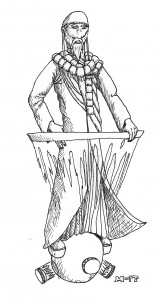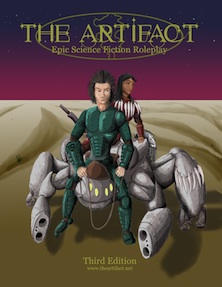 In most games, characters start off as blank slates. Over time the players find a niche with them and maybe sculpt out a personality. Given the danger most characters face, that personality tends to be grim and practical. The character doesn’t trust anyone and will use any resource available to them, even if it makes them a villain.
In most games, characters start off as blank slates. Over time the players find a niche with them and maybe sculpt out a personality. Given the danger most characters face, that personality tends to be grim and practical. The character doesn’t trust anyone and will use any resource available to them, even if it makes them a villain.
A lot of games do start off the characters with some background information. Unfortunately in a lot of situations that background can be ignored. I start them off with an attitude that the player can try to use to give the character a flavor. That’s worked reasonably well but sometimes the player just can’t imagine playing a character that they rolled “Depressed” for.
Another thing that’s made an impact on the character’s stories is a limitation that can be rolled saying that some high ranking person has a vendetta against them. That’s mostly useful for the GM to come up with a reason they got the dangerous assignment. In one case, a character was arrested because a corporate official’s son had died and he was convinced it was the PC’s fault. It gives the GM a hook to work with.
That’s why I’ve been considering elective traits for the player to choose from. Either the traits have to give the GM story hooks to work with or they only give a benefit to the player when they incorporate the trait in their play. So let’s look at some examples.
The Principled Character
The player comes up with a principle that the character will never cross. For example, ” Doesn’t hit girls.” could be one but the GM would also extrapolate that to mean if the player doesn’t hit girls he also would never attack them. If a female were to attack the PC, he would be forced to only defend and attempt to disable or immobilize her without doing any damage.
Another example of a principled character would be “Never lies”. This would mean to the GM that the character never tries to deceive anyone. The player can’t try and bend it and say “Well, I wasn’t technically lying.” The character has to stick to the spirit of their principle and not just the lettering of it. The player may allow others to lie but should be upset about it and not let it go lightly.
Those are just two examples of any number of principles a player could adopt. Obviously the GM should agree to the principal and how to apply it before the player goes ahead with it. So what does the player get out of it? At first I thought about a stat bonus but that didn’t make a lot of sense and the player could ignore the principle and just get the bonus. That’s why I think the PC should get a special XP bonus after each game they don’t break the principal. If the PC ever does break the principal egregiously, the GM can rule they loose the XP bonus permanently.
Friends and Enemies
This one is a little simpler to apply. The player picks a friend that will stick with them through thick and thin. They also pick an enemy that will not stop trying to harm them. The more powerful the friend, the more powerful their enemy must be. The GM should discuss this at length with the character and flesh out the benefits and consequences that the player is looking for.
Got A Job To Do
This player has a personal goal that they want to accomplish. “Save the whales” could work if your setting has whales. The character must spend most of their effort to accomplishing this task. The benefit is a XP bonus similar to the Principled character.
Any others you can think of? Post them in the comments.


 The Free RPG Blog
The Free RPG Blog
I really love the idea. I mean it.
I would like to just go over the personalities that are in the book and see waht we cant come up with from those and move on from there.